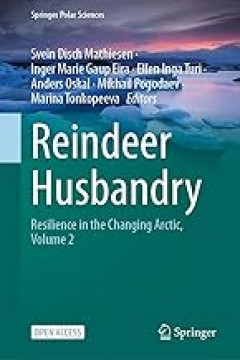Filter by

Mining and indigenous livelihoods: rights, revenues, and resistance
The space left for indigenous peoples' voices in Canadian and Fennoscandian mining legal frameworks : a comparative analysis / Zoé Boirin-Fargues and Sophie Thériault -- Closure and connection : a Southwest Pacific reappraisal of the mining enclave / Pierre-Yves Le Meur and Glenn Banks -- Foreign investor accountability for the violation of indigenous peoples' rights in international invest…
- Edition
- -
- ISBN/ISSN
- 9781003406433
- Collation
- -
- Series Title
- -
- Call Number
- -

Land tenure reform in Sub-Saharan Africa: interventions in Benin, Ethiopia, R…
- Edition
- -
- ISBN/ISSN
- 9781003365679
- Collation
- -
- Series Title
- -
- Call Number
- -
- Edition
- -
- ISBN/ISSN
- 9781003365679
- Collation
- -
- Series Title
- -
- Call Number
- -

Marine Mammals
This highly-readable Open Access textbook provides basic background information about marine mammals and anthropogenic impacts on them. The book includes inspiring exercises for education school programs in natural sciences. The book also provides advice on career paths using case studies of marine scientists and veterinarians describing their journeys from student to profession. By sharing rea…
- Edition
- 1
- ISBN/ISSN
- -
- Collation
- -
- Series Title
- -
- Call Number
- X, 95

Reindeer Husbandry
This open access book focuses on climate change, Indigenous reindeer husbandry, and the underlying concept of connecting the traditional knowledge of Indigenous reindeer herders in the Arctic with the latest research findings of the world’s leading academics. The Arctic and sub-Arctic environment, climate, and biodiversity are changing in ways unprecedented in the long histories of the n…
- Edition
- 1
- ISBN/ISSN
- -
- Collation
- -
- Series Title
- Springer Polar Sciences
- Call Number
- XXVI, 278

Sperm Competition in Butterflies
This book describes about 30 years of theoretical, empirical, and experimental work on butterfly sperm competition. It considers the reproductive morphology and sperm utilisation interests of males and females, which shape the mating tactics of each sex. Females of most butterfly species mate multiple times throughout their lives. The reasons are explored, as well as the numerous adaptations ma…
- Edition
- -
- ISBN/ISSN
- 978-4-431-55945-0
- Collation
- -
- Series Title
- -
- Call Number
- -

Exploring Animal Behavior Through Sound: Volume 1
This open-access book empowers its readers to explore the acoustic world of animals. By listening to the sounds of nature, we can study animal behavior, distribution, and demographics; their habitat characteristics and needs; and the effects of noise. Sound recording is an efficient and affordable tool, independent of daylight and weather; and recorders may be left in place for many months at a…
- Edition
- 1
- ISBN/ISSN
- 978-3-030-97540-1
- Collation
- -
- Series Title
- 1 b/w illustrations
- Call Number
- XVII, 517

Urban Geology
Urban subsurface resources and particularly urban groundwater are vulnerable to environmental impacts, and their rational management is of major importance. In this book a multidisciplinary team of specialists and scientists presents innovative process-oriented approaches to the sustainable use of these resources. The included case studies from northwestern Switzerland describe representative e…
- Edition
- 1
- ISBN/ISSN
- 978-3-0348-0185-0
- Collation
- -
- Series Title
- -
- Call Number
- XVI, 216

Planetary Hinterlands
This open access book considers the concept of the hinterland as a crucial tool for understanding the global and planetary present as a time defined by the lasting legacies of colonialism, increasing labor precarity under late capitalist regimes, and looming climate disasters. Traditionally seen to serve a (colonial) port or market town, the hinterland here becomes a lens to attend to the times…
- Edition
- -
- ISBN/ISSN
- 978-3-031-24243-4
- Collation
- XVI, 341
- Series Title
- -
- Call Number
- -

Acceleration and Cultural Change
This open access book includes socio-anthropological and anthropo-sociological conversations between one of the world’s leading anthropologists, Thomas Hyland Eriksen, and a young scholar, using his groundbreaking "overheating" approach.This book includes socio-anthropological and anthropo-sociological conversations between one of the world’s leading anthropologists, Thomas Hyland Eriksen, …
- Edition
- -
- ISBN/ISSN
- 978-3-031-33099-5
- Collation
- XXII, 111
- Series Title
- -
- Call Number
- -

Reindeer Husbandry
This open access book focuses on climate change, indigenous reindeer husbandry and the underlying concept of connecting the traditional knowledge of indigenous reindeer herders in the Arctic with the latest research findings of the world’s leading academics. The Arctic and sub-Arctic environment, climate and biodiversity are changing in ways unprecedented in the long histories of the nor…
- Edition
- -
- ISBN/ISSN
- 978-3-031-42289-8
- Collation
- XXXVI, 217
- Series Title
- -
- Call Number
- -
 Computer Science, Information & General Works
Computer Science, Information & General Works  Philosophy & Psychology
Philosophy & Psychology  Religion
Religion  Social Sciences
Social Sciences  Language
Language  Pure Science
Pure Science  Applied Sciences
Applied Sciences  Art & Recreation
Art & Recreation  Literature
Literature  History & Geography
History & Geography